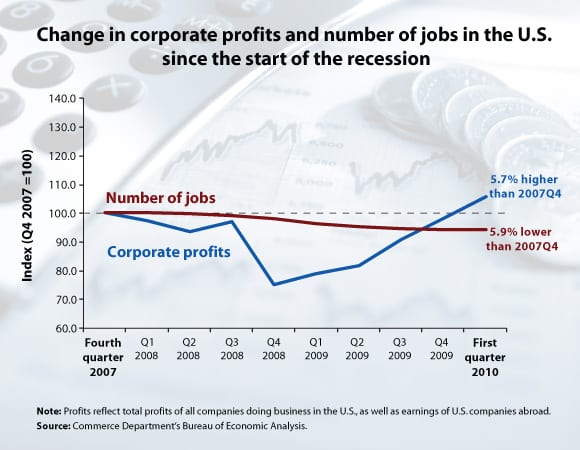Is there an economic recovery underway? Was there one that has now stopped? Will our current recession, partly recovered from, now tumble downward again in a second or “double” dip? Mainstream politicians, journalists, and academics are engaged in hot and heavy debates about recoveries and double dips. Yet the economic reality for most Americans is altogether different.
The Economic Policy Institute (EPI) in Washington produced the graph below that we can use to clarify and correct the confusion about “recovery” and “double dip recessions.”
The graph shows that what “recovered” were corporate profits that had fallen from the crisis’s beginning in late 2007 until they hit bottom late in 2008. After that, corporate profits “recovered” and rose to mid-2010 lifting the stock market with them. After the EPI graph ends around April 2010, this recovery of corporate profits and stock prices stalled and now threatens to turn down again. A second downturn of corporate profits would be that “double dip recession” feared by politicians, journalists, and academics who revealingly confuse what happens to profits with what happens to the economy.
A better measure of economic conditions is the number of paid jobs provided by the economy. The EPI graph shows that number to have begun its fall early in this Great Recession and to have continued that decline ever since. Jobs disappeared even as hundreds of thousands of young people finished their schooling and newly began looking for work. At the same time, reduced hours and involuntary furloughs deteriorated the qualities of many jobs that were not cut. So too did the widespread decreases in wages and benefits (pensions, medical insurance, holidays, etc.). Job insecurity rose for nearly everyone.
There never was a “recovery” for the mass of Americans. Business had a recovery and now faces a double dip. For the mass of workers, they face no double dip since their economic conditions never recovered. Their risk is that corporations would respond to a double dip in their profits by shifting still more of the costs of this capitalist crisis onto workers.
Richard D. Wolff is a Professor Emeritus at the University of Massachusetts in Amherst and also a Visiting Professor at the Graduate Program in International Affairs of the New School University in New York. He is the author of New Departures in Marxian Theory (Routledge, 2006) among many other publications. Check out Richard D. Wolff’s documentary film on the current economic crisis, Capitalism Hits the Fan, at www.capitalismhitsthefan.com. Visit Wolff’s Web site at www.rdwolff.com, and order a copy of his new book Capitalism Hits the Fan: The Global Economic Meltdown and What to Do about It.
| Print

